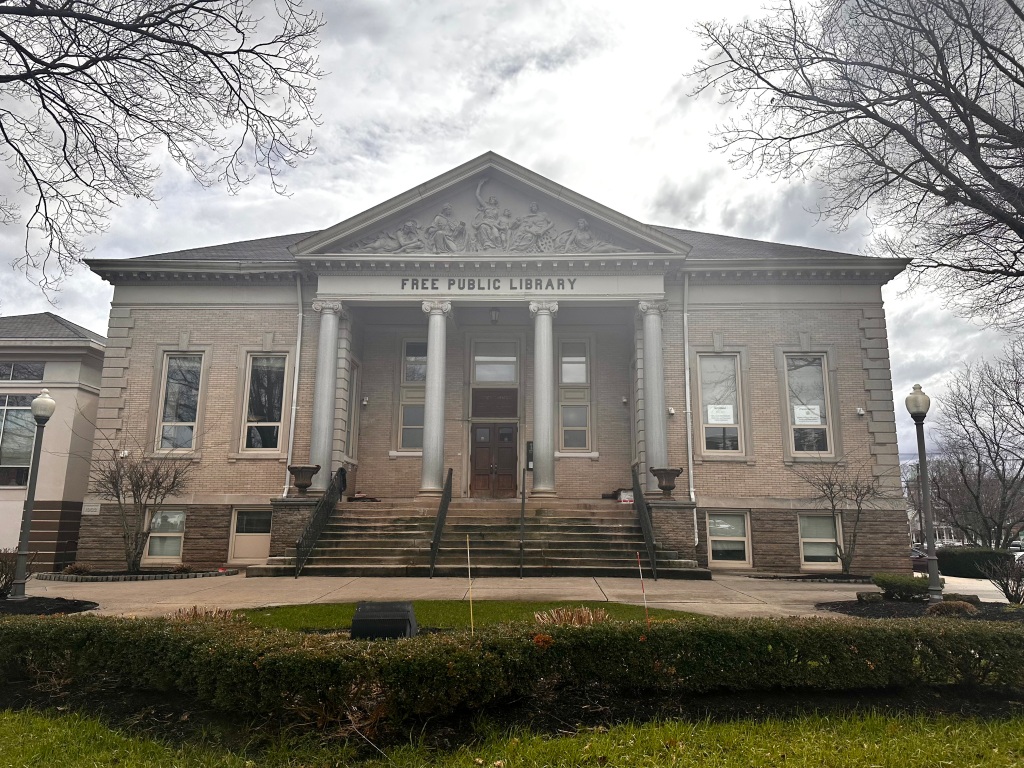One of the highlights during my time in Columbus last week occurred outside the walls of the biennial Public Library Conference. I spent the afternoon with Brina Collins, a social work student intern from The Ohio State University who is conducting her field placement at the Columbus Metropolitan Library (CML).
Though I typically advise against BSW level interns in public libraries, Brina is a great exception to the rule. As a non-traditional student, she brings relevant life and professional experiences to her internship at the Whitehall Branch. From the get go, she noted her ability to set up and maintain appropriate boundaries in regards to her role at the library. Yes!
She met me just inside the entrance of Whitehall’s relatively new (2014) building on a wet, overcast afternoon. Just inside the entrance, she pointed out the branch’s “Blessing Box” : a table created by a previous social work intern that offers non-perishable food and toiletries for “customers” (CML’s lingo for patrons) to take as needed. The recent donation of snacks is apt for the sizable number of children and youth that comprise Whitehall’s community. After school meals are also supplied weekly through the Children’s Hunger Alliance.
I am impressed by this internship on several levels. First, the three social work students at Columbus Metropolitan Library are employees so they are paid about $17 an hour for the sixteen hours they spend at their respective branches each week. Second, Brina has an incredibly supportive and engaged library “task instructor” in Whitehall’s Director, Lauren Lancaster, who has provided Brina with the freedom to conduct outreach and offer creative services to patrons in need. For example, this winter Brina took the initiative to organize a temporary food pantry and potluck inside the library. She also coordinated tabling events with local partners such as the Community Refugee & Immigration Services and Ethiopian Tewahedo Social Services.
Security personnel at CML are also library employees, meaning that they–and the rest of the library team–are trained on similar safety protocols and skills such as de-escalation tactics and how to administer Narcan. Security also share the communal office space with fellow library colleagues, thereby taking steps to build unity among Whitehall’s team.







Though she does not have a private office, Brina utilizes the shared workspace to access one of several available computers, a phone line, and a dedicated “serenity room” for employees to decompress when necessary. Even better, when it’s necessary for her to meet privately with patrons, Brina utilizes Whitehall’s Sound Booth. This soundproof room ensures that discussions with patrons are confidential and its glass walls keep Brina in sight of others for her safety (genius!). Brina stated that the top need of customers who seek her assistance is housing. In addition to helping patrons sign up for emergency rental assistance, she also helps manage expectations about the years-long waiting list for Section 8 housing.
As a senior, Brina is in the process of winding down her internship. This means she is practicing the social work skill of healthy termination with her regular CMH customers and shifting her focus to the needs of library staff. Brina actively listens to staffs’ concerns and empowers their capacity to continue much of the work she’s implemented at Whitehall over the last eight months. She even distributed a digital survey to gauge about how staff manage workplace stressors. Results were discussed in a staff meeting and Brina followed up by providing them with information on mindfulness techniques and different forms of rest.
Brina credits her placement at the Whitehall library with generating a solid skill set of resourcefulness. The internship also enhanced her desire to pursue a MSW degree this fall with a focus on macro, advocacy work. A recent trip with DC Advocacy Immersion to Washington allowed her to talk with policy makers and legal experts about the needs of Whitehall residents. This experience further fueled Brina’s passion to work for change on a broader, systemic level.
Meeting with Brina demonstrated the various facets of an internship done well: vetting an excellent, mature student; a supportive library director and team; embedding the student into the library community as a paid employee; a good working relationship with library security; freedom to try innovative programming; and ample work space. This is a collaboration that deserves to be celebrated. Well done!














